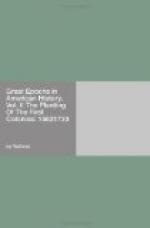[1] Penn had already been part proprietor of West Jersey when in 1681 he received the grant of Pennsylvania, as compensation for a claim of his father’s estate against the English Government. He came out in person to America in 1682, made his famous treaty with the Indians and founded Philadelphia. He returned to England in 1684, and again visited Pennsylvania in 1699-1701. His account is printed in Hart’s “American History Told by Contemporaries.”
II
PENN’S TREATY WITH THE INDIANS
(1683)
HIS OWN ACCOUNT[1]
Every king hath his council; and that consists of all the old and wise men of his nation, which perhaps is two hundred people. Nothing of moment is undertaken, be it war, peace, selling of land, or traffic, without advising with them, and, which is more, with the young men, too. It is admirable to consider how powerful the kings are, and yet how they move by the breath of their people. I have had occasion to be in council with them upon treaties for land, and to adjust the terms of trade.
Their order is thus: The king sits in the middle of an half-moon, and has his council, the old and wise, on each hand. Behind them, or at a little distance, sit the younger fry in the same figure. Having consulted and resolved their business, the king ordered one of them to speak to me. He stood up, came to me, and in the name of the king saluted me, then took me by the hand, and told me that he was ordered by his king to speak to me, and that now it was not he but the king who spoke, because what he should say was the king’s mind. He first prayed me to excuse them, that they had not complied with me the last time. He feared there might be some fault in the interpreter, being neither Indian nor English. Besides, it was the Indian custom to deliberate and take up much time in council before they resolved; and that, if the young people and owners of the land had been as ready as he, I had not met with so much delay.




